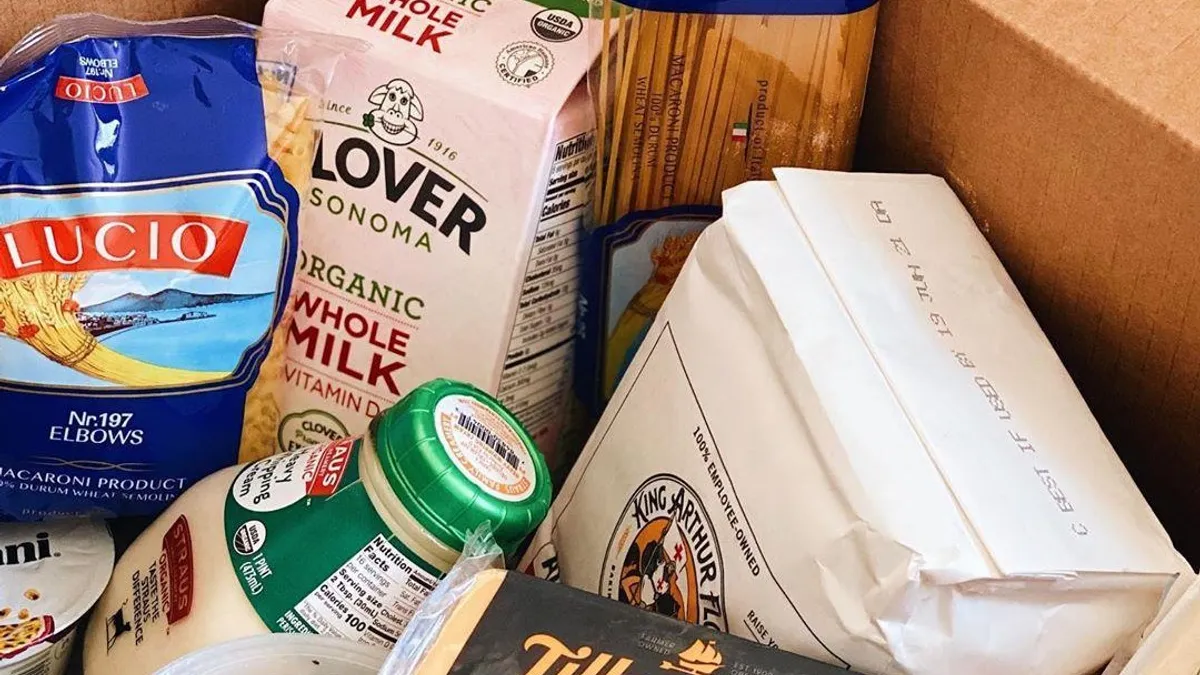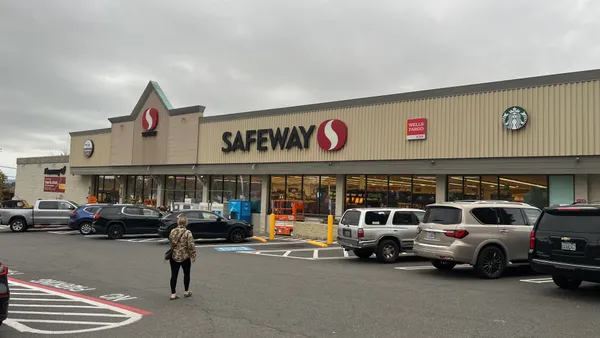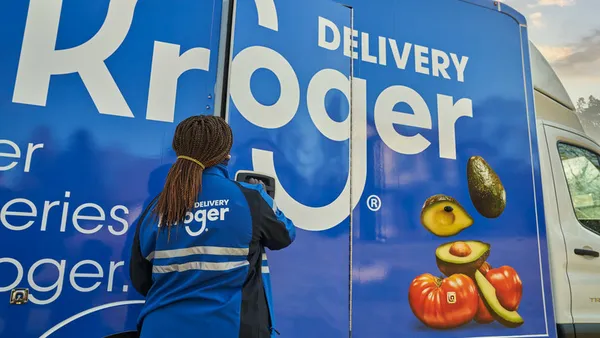The online grocery boom has helped launch a raft of new e-grocers in recent months, including one startup with a very unique backstory.
Buffalo Market launched in California last month touting a familiar focus on local foods and competitive prices. Not mentioned in its announcement, however, was the fact that the e-grocer has its roots in car-based services.
“The company had almost three births,” Sean Howell, co-founder of Buffalo Market, said.
The first was as a logistics company founded in 2019 that worked with hotels to provide rental cars to their guests, Howell said. Right as the novel coronavirus pandemic hit the U.S. in March, the company pivoted to a food delivery service called RydeOn Groceries that Howell likened to Instacart.
In September, the company rebranded itself as an online grocer serving markets up and down the Golden State. By October, RydeOn Groceries officially became Buffalo Market.
Howell, a self-described food activist, restaurateur and technologist, said he first became familiar with RydeOn as a customer and teamed up with Adam Olejniczak, who founded RydeOn last year.
Howell said he saw the company as a way to scale sustainable farming, and after raising a “tiny amount” of pre-seed funding, Buffalo Market was born. “We are scaling as fast as we can,” Howell said, noting that the company is growing 36% in sales month-over-month.
Buffalo Market is growing in a metropolitan area that has helped launch numerous online grocers in recent years, including Farmstead, Good Eggs and Weee. The emergence of more grocery delivery options comes at a time when the novel coronavirus pandemic is impacting in-store traffic and e-commerce is estimated to be worth $250 billion in five years.
The online startup offers next-day delivery and has a focus on locally sourced food. Shoppers can find a variety of items: organic produce, baked goods, meat, seafood, dairy, eggs, beverages and dry groceries. There are also household items, including eco-friendly brands like Seventh Generation and Mrs. Meyer’s, and food for people following Keto diets.
Popular items include organic, fair trade bananas; organic avocados, limes, celery and beets; free-range eggs; and grass-fed beef, Howell said. “The customer ends up being able to buy something that's very local, organic and at a price that's lower than conventional groceries,” Howell said.
Buffalo Market also has a rewards program that includes coupons for referrals and ways to rack up digital coins that convert to savings on orders of $50 or more.
“It's one thing to have a small grocer that has great food ethics but only serves a very limited set of customers,” Howell said. “We serve from Sacramento to Los Angeles — an area of 14 million households.”
Howell said the company utilizes the software and algorithms from its ride-sharing days to optimize its delivery routes — a step that keeps costs low, preserves freshness and cuts down on food waste.
“Our delivery routes are optimized from a cost perspective versus the way other food delivery companies are optimized around speed, and to make that even functional, those companies have to increase costs,” he said.
Expanding operations and marketing
Currently, the company has 60 employees and occupies roughly 20,000 square feet with a warehouse and offices in Hayward, California, but expansion plans in the works will more than double the warehousing capacity and increase employees eightfold.
Buffalo Market is planning to utilize at least 35,000 square feet of warehouse space and hire 400 employees in the next two years in Sacramento, California, which is known as an agriculture hotspot. “It just makes sense for us to have a really big presence there,” Howell said.
The grocer plans to focus on hiring individuals within logistics, as well as food buyers and quality control specialists, according to a press release. Howell said Buffalo Market aims to have its warehouse operations running in Sacramento by May 2021.
Tentatively, a future Los Angeles area facility would add a “smaller, but sizable” number of employees, and Buffalo Market will likely bring more warehouses to both San Francisco and Los Angeles in the future, he said.
While most of the employees work in the Hayward warehouse or make deliveries, Howell wants to create a “huge content team” in the coming years that can promote the company's products and offer practical solutions.
“We want to have a lot of content and introduce new things to people, teach them that they can use the greens that come with the beets and how to do that correctly and how to make chicken stock and things like that,” he said.
The website features recipes like meatloaf made from bison, corn truffle quesadilla, peach cobbler ice cream sundaes and wild rice butternut squash stuffing. Shoppers can also peruse a regularly updated blog. “Currently, we really focus on the seasonality of produce and teaching people about what's in season and how to buy things,” Howell said.
The blog also serves as a platform for the co-founders to address the impact of the climate crisis on agriculture. California saw a devastating heatwave during the summer that led to a state of emergency and sparked power outages coupled with fires still blazing across the state. Howell said the heatwave will likely have the longest repercussions on farmers, already limiting the availability of raspberries and strawberries and the ability of workers to be in the fields.
With the coronavirus pandemic still underway, social distancing between employees has made work slower and more unpredictable, Howell said.
Howell said the food industry hasn’t caught up to consumers’ values for reducing waste and organic, and that Buffalo Market is hoping to convert conventional shoppers who might not be focused on those things by offering competitive prices and fresh food.
While Howell said he could see Buffalo Market potentially come to the East Coast in the future, but for the next few years the focus will be on California.
“Winning 1% of the San Francisco Bay Area is $200 million a year in grocery sales alone,” Howell said.












